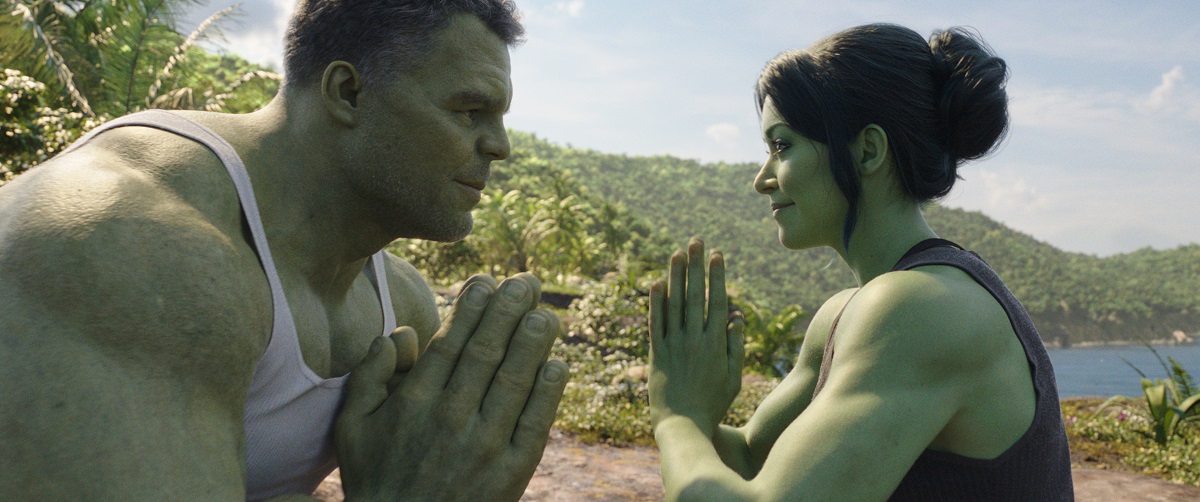“What is the responsibility of those in power?”
These are the first words of Marvel’s new series, “She-Hulk: Attorney at Law,” premiering on Disney+ tomorrow, August 18th. Establishing the ethos of the show, it is only the first of many meta moments and sentiments pointed at the culture of Marvel and feminist ideas. Fan criticism regarding the power of those in charge in the filmmaking industry is often directed towards the importance of diversity and inclusion on the screen. Marvel hasn’t done feminism perfectly: there are satisfying ups (like “Captain Marvel”) and cringeworthy downs (like that painful “she’s got help” prelude to battle in “Avengers: Endgame“).
Given Marvel’s recent shift to promoting female heroes—despite frequently hopscotching the line of genuine, thoughtful inclusion and transient, half-baked “girl-power” moments—it was only a matter of time before we saw an adaptation of “She-Hulk” on the small or big screen. The polarizing perspectives from Marvel fans, some who critique the efficacy of female inclusion, and others who proclaim the downfall of the “M-She-U,” is harnessed and confronted in this series.

Tatiana Maslany plays Jennifer Walters, cousin of Bruce Banner, who absorbed an accidental-yet-consequential amount of his blood and became a Hulk herself. With a successful career as a lawyer and a determination to avoid superheroism, Jennifer shuns her new reality until the ability to keep it private is stripped. Not only is she thrown into managing an entirely new facet of her corporeal state whilst trying to maintain her established life, but she also is tasked with confronting the sexism and exploitation of her newfound fame as a female superhero.

While addressing the culture of misogyny as a societal trait and a sector of Marvel fandom, “She-Hulk” is not overly serious or ham-fisted with commentary. Like any other output in Marvel’s extensive filmography, there is the same old meta humor and poorly blended punchlines in the script. Marvel’s humor is predictable, and the jokes in “She-Hulk: Attorney at Law” are no exception.
Though not every attempt at a zinger lands, the ones that do are laugh-out-loud worthy, and the show is most successful with its physical comedy as Jennifer learns and embraces her Hulk strength. The fight scenes in the series are creative and fast-paced, not neglecting the brawn of battle for laughs. We get a taste of what She-Hulk’s power looks like, and with fun cameos littered throughout, we get to experience the glee of seeing other characters in action too.
Ahead of the show’s release, a lot of the discussion has concerned its CGI. And yes, it’s batty. In its favor, the low resolution previews fans have already seen have stomped expectations into the ground. But the more you watch it within the show, the more you adapt, and the less glaring the poor CGI becomes.
“She-Hulk: Attorney at Law” is a fun series with good action, decent comedy, and feminist thoughtfulness. It addresses the differences in gendered perception and depiction by media and society at large, the distinctiveness and power of female anger, and the forced monolith that female heroes are expected to be. Is it profound? Not in the slightest, but while more female depiction is always a positive addition to Marvel adaptations, it’s not necessary nor desired that every female hero story be gravely serious and aggressively outlined with bullet points on feminist theory and reality. Women want to see women be women, and while thoughtfulness is expected, making the existence of female characters reliant exclusively on the struggles of womanhood isn’t feminism.
“She-Hulk: Attorney at Law,” carefully chooses which issues to highlight, and allows the rest to be the entertainment we expect.
First four episodes screened for review.












